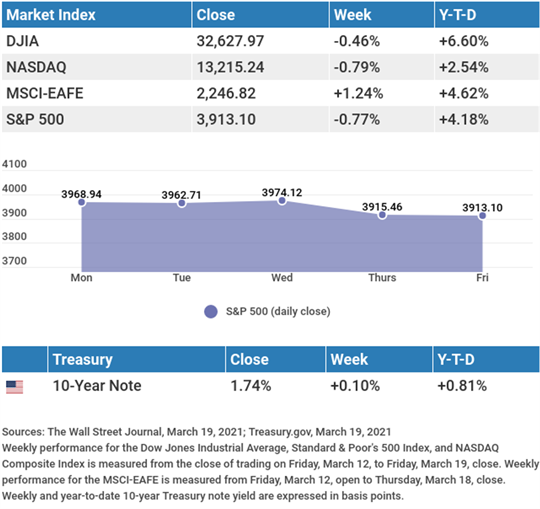
Rising bond yields and improving economic conditions led to a choppy
week of trading that ended in modest losses for investors.
The Dow Jones Industrial Average fell 0.46%, while the Standard & Poor’s
500 declined 0.77%. The Nasdaq Composite index lost 0.79% for the
week. The MSCI EAFE index, which tracks developed overseas stock
markets, gained 1.24%.1,2,3


Rising Yields
The stock market began the week on a positive note, rising on optimism over the economic reopenings and a decline in bond yields. Technology shares staged a strong turnaround from the previous week.
Following the FOMC (Federal Open Market Committee) meeting announcement reaffirming the Fed’s easy-money policies, the Dow Industrials and the S&P 500 recorded new record closing highs.4
Markets reversed themselves on Thursday as a surge in yields sent technology and other high-growth stocks lower. During the session, the 10-year Treasury yield moved above 1.75% (the highest in 14 months), and the 30-year Treasury breached 2.5% for the first time since August 2019.5
Stocks closed out the week mixed as technology reclaimed some of the previous day’s losses.
The Fed Stands Pat
The Fed restated its commitment to no interest rate hikes through 2023. As expected, the FOMC also voted to continue its monthly bond purchases of at least $120 billion.
FOMC members projected that the economy would grow 6.5% this year, a sharp improvement over its previous estimate of a 4.2% gain. The forecast for the unemployment rate by year-end is 4.5%, down from the current rate of 6.2%. While Fed Chair Powell said that he anticipates inflation rising this year, he expects price increases to be temporary, with inflation staying within the Fed’s 2% target for the next several years.6
Robert Roman
CEO, Managing Director
THIS WEEK: KEY ECONOMIC DATA
Monday: Existing Home Sales.
Tuesday: New Home Sales.
Wednesday: Durable Goods Orders. Purchasing Managers’ Index (PMI) Composite Flash.
Thursday: Gross Domestic Product (GDP). Jobless Claims.
Friday: Consumer Sentiment.
Source: Econoday, March 19, 2021
The Econoday economic calendar lists upcoming U.S. economic data releases (including key economic indicators), Federal Reserve policy meetings, and speaking engagements of Federal Reserve officials. The content is developed from sources believed to be providing accurate information. The forecasts or forward-looking statements are based on assumptions and may not materialize. The forecasts also are subject to revision.
THIS WEEK: COMPANIES REPORTING EARNINGS
Tuesday: Adobe, Inc. (ADBE), Gamestop Corporation (GME).
Wednesday: General Mills (GIS).
Thursday: Darden Restaurants, Inc. (DRI).
Source: Zacks, March 19, 2021
Companies mentioned are for informational purposes only. It should not be considered a solicitation for the purchase or sale of the securities. Investing involves risks, and investment decisions should be based on your own goals, time horizon, and tolerance for risk. The return and principal value of investments will fluctuate as market conditions change. When sold, investments may be worth more or less than their original cost. Companies may reschedule when they report earnings without notice.

“Spring will come and so will happiness. Hold on. Life will get warmer.”
– Anita Krizzan

IRS Offers Free Tax Prop Option for Military Personnel
Each year, the Internal Revenue Service takes a moment to remind active duty military personnel that the “IRS Free File” offers them multiple choices for free federal tax preparation.
“The IRS takes special steps to help military members and their families with their taxes, and the Free File program is part of that effort,” said IRS Commissioner Chuck Rettig. “Almost 10% of the IRS workforce are veterans. We greatly appreciate the service to the nation of every veteran and their supportive families, and we will do all we can to assist them.”
* This information is not intended to be a substitute for specific individualized tax advice. We suggest that you discuss your specific tax issues with a qualified tax professional.
Tip adapted from IRS.gov7

Yoga for Stability
You don’t have to pull out the yoga mat and get your designer leggings on to enjoy some of the many benefits of this relaxing practice. Even if you’ve never done yoga before, these poses may help you improve your balance and stability:
- Knee to Chest – Start by standing with your feet hip-width apart with your hands on your hips. This is called mountain pose. Now, lift your left knee to hip height, so your upper leg (thigh) is parallel with the floor. Flex your left foot and hold this pose for three deep breaths. Repeat on the other side.
- Tree Pose – Start with the same mountain pose as the first movement. Now, shift your weight into your left foot, and allow your right knee to turn out to the side as you bring your right foot in to rest at your left ankle, shin, or thigh, depending on what’s comfortable. Make sure you’re not putting your foot on the joint itself.
- Dancer Pose – Start in mountain pose. Bend your right knee and slowly lift your right foot off the ground. As you do that, lift your left arm to balance yourself. Hold for three breaths and repeat on the other side.
Tip adapted from SilverSneakers.com8

I have no heart or mind, but I do have two legs. Yet they only touch the ground when I am not carrying things around. What am I?
Last week’s riddle: Where does today come before yesterday? Answer: In the dictionary.


Footnotes and Sources
1. The Wall Street Journal, March 19, 2021
2. The Wall Street Journal, March 19, 2021
3. The Wall Street Journal, March 19, 2021
4. CNBC, March 17, 2021
5. CNBC, March 18, 2021
6. CNBC, March 17, 2021
7. IRS.gov, January 21, 2020
8. SilverSneakers.com, March 12, 2018
Investing involves risks, and investment decisions should be based on your own goals, time horizon, and tolerance for risk. The return and principal value of investments will fluctuate as market conditions change. When sold, investments may be worth more or less than their original cost.
The forecasts or forward-looking statements are based on assumptions, may not materialize, and are subject to revision without notice.
The market indexes discussed are unmanaged, and generally, considered representative of their respective markets. Index performance is not indicative of the past performance of a particular investment. Indexes do not incur management fees, costs, and expenses. Individuals cannot directly invest in unmanaged indexes. Past performance does not guarantee future results.
The Dow Jones Industrial Average is an unmanaged index that is generally considered representative of large-capitalization companies on the U.S. stock market. Nasdaq Composite is an index of the common stocks and similar securities listed on the NASDAQ stock market and is considered a broad indicator of the performance of technology and growth companies. The MSCI EAFE Index was created by Morgan Stanley Capital International (MSCI) and serves as a benchmark of the performance of major international equity markets, as represented by 21 major MSCI indexes from Europe, Australia, and Southeast Asia. The S&P 500 Composite Index is an unmanaged group of securities that are considered to be representative of the stock market in general.
U.S. Treasury Notes are guaranteed by the federal government as to the timely payment of principal and interest. However, if you sell a Treasury Note prior to maturity, it may be worth more or less than the original price paid. Fixed income investments are subject to various risks including changes in interest rates, credit quality, inflation risk, market valuations, prepayments, corporate events, tax ramifications and other factors.
International investments carry additional risks, which include differences in financial reporting standards, currency exchange rates, political risks unique to a specific country, foreign taxes and regulations, and the potential for illiquid markets. These factors may result in greater share price volatility.
Please consult your financial professional for additional information.
This content is developed from sources believed to be providing accurate information. The information in this material is not intended as tax or legal advice. Please consult legal or tax professionals for specific information regarding your individual situation. This material was developed and produced by FMG Suite to provide information on a topic that may be of interest. FMG is not affiliated with the named representative, financial professional, Registered Investment Advisor, Broker-Dealer, nor state- or SEC-registered investment advisory firm. The opinions expressed and material provided are for general information, and they should not be considered a solicitation for the purchase or sale of any security.
Copyright 2021 FMG Suite.

